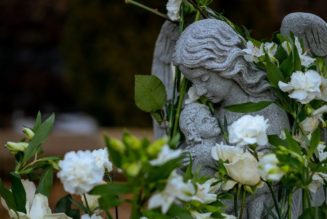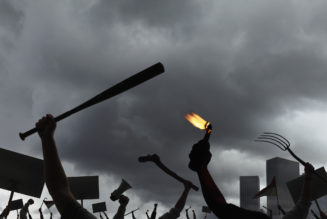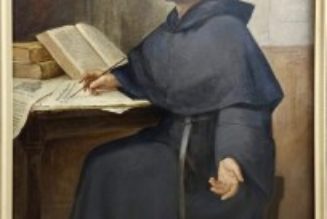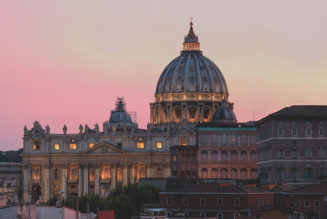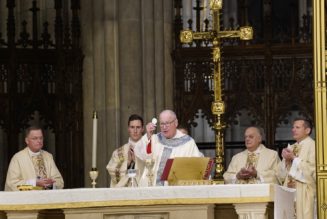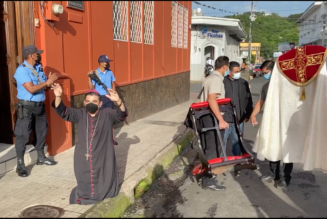ROME – A former high-level Vatican official, seen as a theological conservative sometimes at odds with Pope Francis over issues such as the Latin Mass, was elected Monday as the new leader of the Bishops’ Conference of Emilia-Romagna, a key northern region of Italy that centers on the city of Bologna.
Immediately the selection sets up an intriguing contrast between Archbishop Giacomo Morandi, the new leader of the regional conference, and Cardinal Matteo Zuppi of Bologna, president of the national bishops’ conference (CEI) and a leading papal ally.
Morandi, 58, is currently archbishop of the Diocese of Reggio Emilia-Guastalla in Emilia-Romagna. Previously, he served as secretary of the Vatican’s Dicastery for the Doctrine of the Faith (DDF) from 2017-2022.
Morandi was elected president of the Emilia-Romagna bishops’ conference (CEER) Jan. 15, taking over the position from Zuppi, who also serves as the pontiff’s personal envoy for the war in Ukraine.
In a statement, the Archdiocese of Bologna said Zuppi specifically requested not to be elected to a second term as head of the regional conference given his role as president of CEI.
In the course of the meeting, other bishops from the region thanked Zuppi for his service throughout his 5-year term and congratulated both Morandi and Bishop Adriano Cevolotto of Piacenza-Bobbio, who was elected vice president of CEER.
Thanks were also given to Archbishop Lorenzo Ghizzoni of Ravenna-Cervia, who is the outgoing vice president of the CEER and who currently serves as president for the National Service for the Protection of Minors for both CEI and the CEER.
In addition to electing new leadership, bishops from Emilia-Romagna also discussed their upcoming ad limina visit to Rome, which is scheduled for Feb. 26, and which takes place every few years, providing the prelates face time with Pope Francis and several Vatican departments.
Several dioceses from the region are expected to organize pilgrimages to Rome for the occasion and will be present for Pope Francis’s public general audience that week.
A biblical scholar, Morandi, prior to his Vatican position, served as vicar general of his native Modena-Nonantola Archdiocese, and he has also served as a professor at Modena’s Institute of Religious Sciences.
He was one of several high-ranking Vatican officials to leave the Roman curia in recent years amid Pope Francis’s sweeping reform of the Church’s central governing bureaucracy.
When the Vatican announced Jan. 10, 2022, that Morandi was leaving his post as secretary of the DDF and would take the helm at the Diocese of Reggio Emilia-Guastalla, the reassignment raised some eyebrows, as Morandi is perceived as theologically more conservative than Pope Francis, and his appointment was for a post traditionally led by a simple bishop, whereas Morandi holds the rank of archbishop.
Morandi’s departure was seen as part of a broader effort by Pope Francis to restructure the curia according to his vision and to weed out officials who did not necessarily share that vision, or his sense of pastoral priorities.
Throughout the spring and summer of 2021, Pope Francis held apostolic visitations of several curial departments, including the Congregation for Divine Worship and the Discipline of the Sacraments, the Congregation for Clergy, and the Dicastery for Integral Human Development.
After each visitation, a new prefect was named for the respective department.
In the case of the department for liturgy, the visitation took place in March 2021 after the retirement of its previous prefect, Guinian Cardinal Robert Sarah, and before the appointment of his successor, British Cardinal Arthur Roche. The visitation for the clergy department took place in June 2021, shortly before the retirement of Cardinal Beniamino Stella, who turned 80 in August 2021. South Korean Cardinal Lazzaro You Heung-sik was named his successor shortly after.
Though no reasons were given for Morandi’s exit, some observers believed at the time that it was potentially related to disagreement with Pope Francis’s decision in 2021 to issue a decree restricting use of the Traditional Latin Mass.
After Morandi’s ouster in January 2022, Pope Francis that year as part of his reform of the Roman Curia further restructured the DDF, appointing Irish Father John Joseph Kennedy as secretary of the department’s disciplinary section and Italian Father Armando Matteo as secretary of its doctrinal section in April 2022.
French Father Philippe Curbelié was appointed undersecretary July 2022, and Archbishop Charles Scicluna of Malta maintains his role as adjunct secretary to the DDF, which he has held since 2018.
In July of last year, the DDF’s former prefect, Spanish Cardinal Luis Ladaria, retired, and Pope Francis replaced him with longtime friend and ghostwriter Victor Manuel Fernández, who got a red hat from the pope last September.
Some observers believe Morandi’s election as president of the CEER signals differences between Pope Francis and a generally more conservative Italian episcopate, which has at times been seen as being at odds with his priorities, or at least with his timetable.
During CEI’s May 2019 spring plenary assembly, Francis chastised the prelates over their failure to fully implement a revised marriage annulment procedure that he rolled out in 2015, calling for its “full and immediate” implementation in all dioceses.
In 2021, the Italian bishops launched a multi-year national synod process aimed at reviving “stale structures” largely at the pope’s behest, after the pontiff dropped hints several years in a row, beginning in 2015, that he would like a “synod of the Italian Church.”
During his opening speech at a major CEI conference in Florence in 2015, Francis warned against succumbing to the heresies of Pelagianism and Gnosticism and urged Italian prelates to be pastors rather than “preachers of complex doctrines,” insisting on the importance of the social inclusion of the poor and seeking new vocations.
At the time, Francis said Italy is “not a museum,” but a living place requiring constant work and updating, and he stressed the need to be more inclusive and welcoming in a culture known for its traditional family and moral values, and where regular mass-goers are often overtly hostile to immigrants.
The Italian synod process is ongoing, set to conclude in 2025.
Follow Elise Ann Allen on Twitter: @eliseannallen
